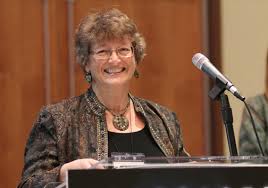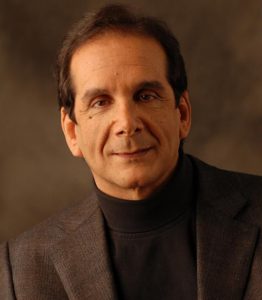A wonderful life

The Bible: Wisdom Literature Series
Jewish Family Education with Candace R. Kwiatek, The Dayton Jewish Observer
In early June, like millions of Americans across the political spectrum, I was stunned to read a public farewell letter by Charles Krauthammer just two weeks before his death.
A familiar face in broadcast journalism, he was also a psychiatrist, Pulitzer Prize-winning columnist, and bestselling author. His diverse interests included reviving forgotten Jewish classical music, playing speed chess, visiting monuments and memorials, and regularly attending Washington Nationals baseball games. But above all, his wife and son were his priorities.
Despite being permanently wheelchair-bound after a freshman-year diving accident, he graduated Harvard Medical School with his class.
During his three-year residency, Dr. Krauthammer was honored for excellence in psychiatric research and clinical medicine.
“I decided if I could make people judge me by the old standard, that would be a triumph and that’s what I try to do,” he reflected. “It seemed to me the only way to live.”
Seeking a new direction, he entered the political arena and boldly challenged leaders of both parties, “drawing praise from conservatives, moderates, and liberals for his thoughtful and meticulously framed remarks,” FoxNews.com Senior Reporter Elizabeth Llorente noted.
Krauthammer believed his role was to challenge people to think, to reflect rather than emote. “History is shaped by its battle of ideas…some things need to be said,” he quipped, but admitted, “I don’t know if I have influence.”
Offering some thoughts on theology in an interview with Dennis Prager, Krauthammer acknowledged that he stood in awe of Creation and feared God. Yet, he personally struggled with the idea of a deity or being that intervenes in the world. The universe is full of mystery beyond human comprehension, Krauthammer ended, and he would rather “leave it as a question rather than an answer.”
Unexpectedly confronted with terminal cancer, Krauthammer shared one final thought: “I leave this life with no regrets. It was a wonderful life — full and complete with the great loves and great endeavors that make it worth living. I am sad to leave, but I leave with the knowledge that I lived the life that I intended.”
We read in Ecclesiastes, “For everything there is a season… A time to be born, and a time to die…A time to cry and a time to laugh…A time to be quiet and a time to speak.”

Krauthammer’s life story brought to mind these verses, and inspire me to explore Ecclesiastes further.
“All is futility,” the text begins, “like a breath or a mist that lasts but a moment. What has been done will be done in the future. Nothing and no one will be remembered. There is nothing new under the sun… All is futility and shepherding wind.”
Depressing at first glance, its author King Solomon’s philosophical outlook seems to be at odds with Krauthammer’s experiences.
And yet, peppered throughout the text are nuggets of wisdom about how to live life to the fullest, making the most of each day during the time allotted to us. It is these ancient insights that are reflected in the life of the late Charles Krauthammer.
“For everything there is a season…” In these familiar verses, “Solomon tells us that life is really a matter of timing,” writes Pastor Keith Krell of Fourth Memorial Church in Spokane, Wash. “For timing is everything… Change occurs constantly. One moment we will be on the mountain peak, the next moment we will be in the valley.”
Solomon concludes, “Remember that nothing is certain in this life.” Our task is to seek meaningful purpose and create positive value — big or small — in the moment.
“Plant your seed in the morning and keep busy all afternoon, for you don’t know if profit will come from one activity or another — or maybe both.” In modern parlance, stay engaged and diversify your activity portfolio, Solomon advises.
At the same time, you cannot control what your successors will do with the fruit of your efforts. Instead, it’s best to simply “enjoy food and drink and to find satisfaction in work,” Divine pleasures in their own right.
“How wonderful to be wise, to analyze and interpret things,”writes Solomon, with his caveat from Proverbs that the beginning of wisdom is fear of the Lord. He adds in Ecclesiastes, “Wisdom is better than foolishness, just as light is better than darkness. For the wise can see where they are going, but fools walk in the dark.”
“A good reputation is more valuable than costly perfume,” Solomon counsels. His advice is echoed in Ethics of the Fathers: There are many crowns, “but the crown of a good name surpasses them all.”
A good name is hard to build but easily destroyed. In the words of the Greek philosopher Heraclitus, “Character is destiny.”
“Two people are better off than one, for they can help each other succeed. If one person falls, the other can reach out and help,” Solomon advises further.
Contemporary author and educator Ron Wolfson similarly teaches that “the foundational principles of Judaism are based on relationships.” Its culture and ethics are all built around sharing our lives with one another, beginning with families.
Solomon offers an overall message of hope, Rabbi Audrey Korotkin of Temple Beth Israel in Altoona, Pa. concludes: “Even if we cannot make sense of life in some grand, cosmic sense, we can find purpose and satisfaction in the tasks of daily life.”
It’s in our hands to make a wonderful life, a life without regret, by blessing each moment of the days we are given.
Literature to share
The World Needs Beautiful Things by Leah Berkowitz. This stunning illustrated book introduces children to the biblical artist Bezalel, builder of the wilderness Tabernacle. Using the technique of midrash, the author brings Bezalel to life from early childhood when he was a collector of the world’s “beautiful things.” Recognition of and gratitude for the world’s beautiful things, including the beauty of being different, are the underlying messages throughout the book. Highly recommended.
The Book of Separation: A Memoir by Tova Mirvis. The opening scene is a bet din, a rabbinic court, where the author will receive her document of divorce. But divorce may not just be from a husband, the text hints. Mirvis’ story reads like a novel, a totally absorbing page-turner. Heartbreaking and provocative, her memoir is about the many degrees of separation in a divorce: partner, family, expected lifestyle, imagined future, perhaps even from herself. The writing is magical, creating a universal tale with a theme that speaks to any life, any culture.
To read the complete August 2018 Dayton Jewish Observer, click here.


